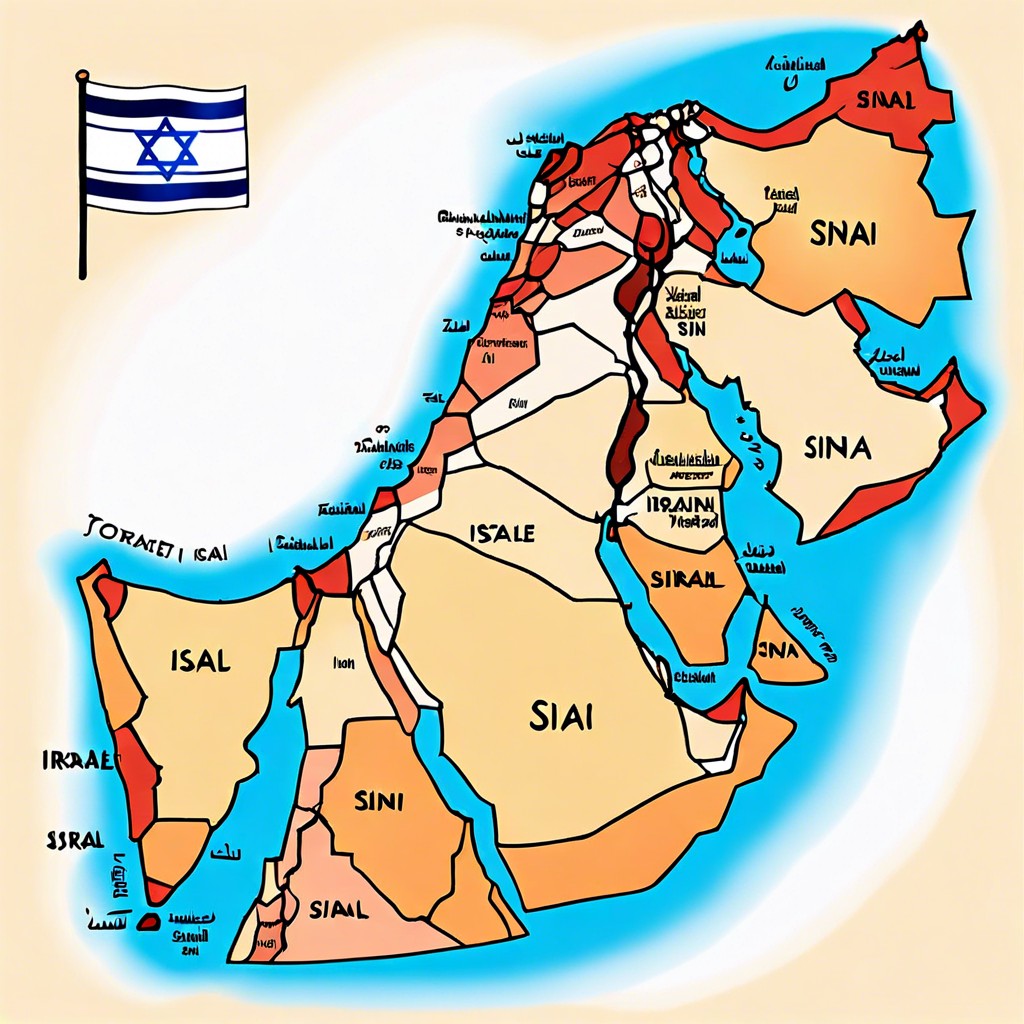Discover how history might have changed and what geopolitical consequences could have arisen if Israel had kept the Sinai Peninsula.
Imagine a world where the sizzling sands of the Sinai Peninsula remained under Israel’s flag. The Middle East, already a labyrinth of intrigue, would be flipped on its head. Think shifting diplomatic chess pieces, oil pipelines re-routing, tour buses meandering through different checkpoints. Beyond politics and economics, we’re diving into the heartbeats of everyday lives—cultures colliding and demography dancing a new jig. Grab your metaphorical passport; it’s time to explore a parallel universe where Sinai stayed Israeli.
Key takeaways:
- Sinai under Israel would shake up Middle East alliances.
- Tension with Egypt, diplomatic dance, and U.N. drama.
- Economic gains: from tourism, oil, to future cities.
- Cultures blend, tensions rise, culinary fusion begins.
- Enhanced security, desert buffer, naval base potential.
Immediate Geopolitical Impact On the Middle East

The ripple effects would definitely be felt far and wide. First off, keep in mind that the Middle East is already a jigsaw puzzle of alliances and rivalries. Israel holding onto the Sinai Peninsula would shift that balance dramatically.
Let’s talk about Egypt. They might turn into a snarling neighbor instead of the current, albeit uneasy, friend. Imagine the tension! Not great for anyone planning a peaceful picnic near the border.
Other countries in the region would also reconsider their stances. Could boost support for Palestinian causes, leading to a united front against Israel. Just picture a geopolitical chess game where every move has thousands of lives hanging in the balance.
Lastly, international players like the U.S., Russia, and China would probably get involved, each spinning their own webs of influence. This shift could either ignite another Cold War-style standoff or, worse, fan the flames of existing conflicts.
Changes in Diplomatic Relations, Especially With Egypt
One of the more curious twists would likely have been the sustained tension between Israel and Egypt. Imagine if the Camp David Accords had never happened. We might have a rivalry with the longevity of a classic soap opera.
Diplomatic circles would probably be much busier. Secret negotiations, back-channel deals, and maybe a few extra awkward United Nations meetings. Trade agreements? Complicated. Cultural exchanges? Awkward holiday cards at best.
Also, forget about the peace we’ve seen in the last few decades. More skirmishes, sneaky espionage plots worthy of a Netflix series, and less cooperation would be on the menu. Cooperation in sectors like agriculture and tech? Probably stalled like a rusty old car.
And tourism? Picture a tense border, guarded like Fort Knox, with travel advisories featuring more than just ‘bring sunscreen’.
All things considered, while the Sinai Desert remains serene today, a different decision could have spun a web of diplomatic jabs worthy of a Shakespearean drama.
Economic Implications: Tourism, Oil, and Development
If Israel had kept Sinai, the economic implications could be monumental. For starters, tourism might have taken a surprising turn. Picture thousands of sun-seekers swapping the Mediterranean coastline for Sinai’s pristine beaches and dramatic landscapes. Think camel treks with Wi-Fi hotspots. Sinai could have become the Dubai of the Mediterranean — minus the future-themed police cars.
Oil, too, would be a game changer. Sinai has significant oil reserves. Israel tapping into this black gold might have bolstered its economic stability, making Tel Aviv the new Houston. Gas stations in Israel could have turned into tiny museums celebrating “The Great Oil Find of Sinai.”
In terms of development, imagine a series of sleek highways and futuristic cities springing up in the desert, pushing Egypt’s El Gouna to second place. Skyscrapers, solar farms, tech hubs… Sinai could have turned Silicon Valley green with envy. Real estate ads would be marketing pyramid views like beachfront property.
Economically speaking, it’s a scenario that combines the wild west’s opportunity with a Middle Eastern twist.
Demographic and Cultural Shifts
Population demographics would see a significant overhaul. Imagine the fusion of cultures where Hebrew meets Arabic in the bustling markets. Sinai’s historic backdrop could blend Israeli innovation with traditional Bedouin lifestyles, creating a melting pot worthy of an Indiana Jones sequel.
However, this cultural cocktail could also stir up tensions. Native Sinai residents might resist assimilation, and clashes over land rights and cultural preservation could become as common as falafel stands. And let’s not forget the bureaucratic chaos of integrating an entirely new region—imagine the paperwork!
On a lighter note, an influx of Israelis to Sinai’s coastal towns might turn these sleepy villages into mini-Tel Avivs, with hummus cafes and tech startups springing up next to ancient ruins. The local cuisine would get a delicious upgrade, too. Bedouin pita meets Israeli shakshuka in a culinary love affair—sounds like a cooking show waiting to happen, right?
Yet, this cultural blend is a double-edged sword. While it holds the promise of enriching diversity, it also risks watering down traditions on both sides. The tightrope walk would require careful, respectful balance.
Military and Security Considerations
Imagine Israel keeping the Sinai Peninsula—hello, enormous desert buffer! This would significantly alter security dynamics. Israel could rest a little easier at night, knowing there’s a lot more sand and fewer immediate threats on its southern border.
Firstly, the Sinai’s vast, challenging terrain would make any military invasion akin to finding a needle in a sand dune. Harder for enemies to march through, easier for Israel to defend.
Next, the strategic advantage: controlling the peninsula would give Israel enhanced oversight over maritime routes in the Red Sea. A few naval bases here and there—why not? Better control of the Suez Canal traffic could also mean more power moves in regional politics.
Don’t forget the potential for peacekeeping challenges. The insurgency risks and maintaining law and order in such a large area could stretch resources. It’s like herding camels, but less predictable.
Lastly, the issue of international relations could spark. Holding Sinai indefinitely might rustle some feathers among global power players, creating extra pressure on Israel’s military to remain ever-vigilant.
So, military considerations wouldn’t just get a tiny tweak; they’d undergo a full desert makeover. Interesting, right?




